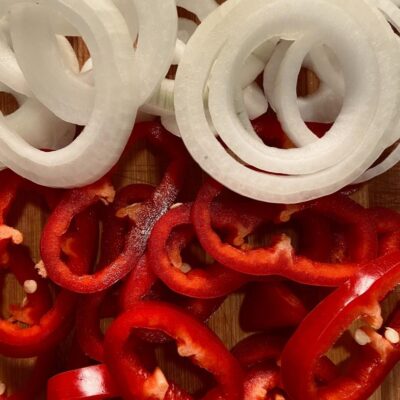No, onions and peppers are unsafe for dogs to eat. Feeding your dog onions is not a good idea since the vegetable is toxic to dogs and can harm them. Chili peppers are also unsafe because of their high heat content. It is best to keep your dog away from peppers and onions to ensure their safety.

Dangerous: This food is generally considered a serious threat to the health and wellbeing of dogs. Please contact your vet, a veterinary hospital or pet poison control if you suspect your dog has eaten this food recently.
Why Can’t Dogs Eat Peppers and Onions?
Onions and spicy peppers are both unsafe because of their content.
Onions contain N-propyl disulfide, which can attach itself to oxygen molecules in the red blood cells preventing access to oxygen throughout the body.
This causes your dog’s immune system to attack its own red blood cells. Eating onions can cause onion poisoning. Always make sure you know the ingredients when feeding your dog savory food.
Chili peppers are not toxic to dogs like onions, but they are incredibly spicy, can be difficult for your dog to digest, and may even cause abdominal distress. Dogs can have bell peppers in any color or variety. But if they are cooked like fajitas, even the bell peppers should be avoided because of their fat content, seasoning and contact with onions.
Symptoms of Onion Poisoning in Dogs
American Society for the Prevention of Cruelty to Animals (ASPCA) suggests looking for the following signs in case your dog has eaten onions:
- Vomiting
- Blood in urine
- Fatigue or lethargy
- High heart rate
- Panting
- Less appetite
Are Peppers Safe for Dogs?
Any pepper that registers positive in Scoville heat units (SHU) can potentially disrupt your dog’s digestive tract and cause gastrointestinal discomfort and even pain, depending on the level of spiciness. Even in their raw, unseasoned form spicy peppers are disruptive to a dog’s body and must be avoided at all costs. This includes dried chili flakes that are added to pizza and sauces, or any types of spicy peppers in salsas and dips. The only safe pepper are bell peppers, and should be cored and finely diced first so that they are not a choking hazard.
Bell peppers offer nutritional value when given in moderation and are a great low-calorie snack. Here are the vitamins and minerals found in bell peppers and their potential benefits:
- Vision: Beta-carotene (red and orange bell peppers), vitamin A, and Vitmain K all support eye health
- Healthy Skin: Beta-carotene supports the elasticity and health of the skin and coat
- Healthy Brain Function: Vitamin B6 lower the levels of homocysteine and can help prevent cognitive decline in pups
- Immune Support & Reduced Inflammation: Vitamins C and A are both essential in supporting your dog’s immune system and overall health
Frequently Asked Questions
-
The quantity depends on the size of your dog. A little bit of onion, such as a nibble, might not harm a large-sized dog, but it can be a concern for a smaller breed.
-
Not all peppers are unsafe for dogs. Peppers that are strongly spicy are best avoided. However, bell peppers are considered good food for a dog.
-
If your dog has only eaten a small number of onions, look for signs of distress and symptoms of onion poisoning. If you are unsure about the amount, immediately take them to the veterinarian.

